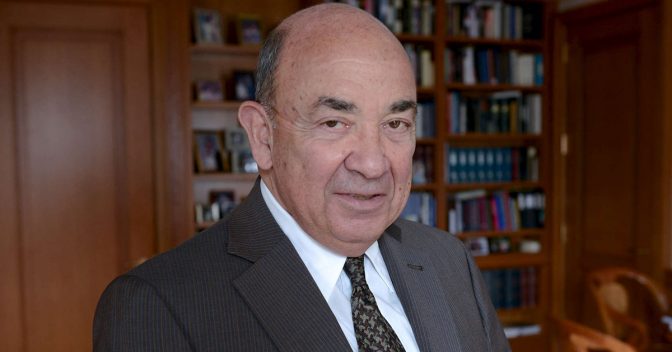New York Judge Dismisses Marijuana Scheduling Case

Updated: Supporters of a lawsuit to strike down federal marijuana prohibition were heartened Feb. 14 when the judge hearing the case said it was clear that cannabis had accepted medical use. But, 12 days later, U.S. District Judge Alvin K. Hellerstein (pictured above) dismissed the case.
One of the plaintiffs’ lawyers David Holland tells Freedom Leaf: «Judge Hellerstein took a unique approach to his analysis of the language of the Controlled Substances Act and the constraints that the petitioning process places upon him. According to his ruling, he believes the plaintiffs need to file a petition with the FDA to reschedule before they can seek relief in his court. Many disagree with that view and other factors he cited as the basis for granting the government’s motion to dismiss.»
The suit, filed last July, sought an injunction to prevent the federal government from enforcing the Controlled Substances Act of 1970 “as it pertains to cannabis.” It argued that the law’s placing marijuana in Schedule I as a drug with “no currently accepted medical use” has no rational basis; that it violates users’ rights to due process and equal protection because it was enacted based on “illegal racial and ethnic animus”; and that it violates patients’ rights to free speech and travel because medicine they need is wrongly prohibited.
The five plaintiffs are Marvin Washington, a former defensive lineman who now works for a medical-marijuana company; Alexis Bortell, a 13-year-old girl whose family moved from Texas to Colorado so she could get marijuana to treat her multiple daily seizures; Jose Belen, an Iraq-war veteran who uses it to deal with post-traumatic stress disorder; Jagger Cotte, a seven-year-old boy who uses it for a congenital disease that few kids survive long enough to see their fourth birthday; and the New York-based Cannabis Cultural Association, a pro-legalization group comprised mainly of African-Americans and Latinos.
RELATED: Freedom Leaf’s Diversity in Cannabis Impact List
At the Feb. 14 hearing, Hellerstein gave the plaintiffs some hope when he said told lawyer Michael Hiller: “Your clients are living proof of the medical appropriateness of marijuana. How could anyone say that your clients’ pain and suffering has not been alleviated by marijuana? You can’t.”
However, Samuel Dolinger, an assistant U.S. attorney for the Southern District of New York, argued that the suit should be dismissed because courts have previously struck down similar claims, the courts should not have jurisdiction until the plaintiffs had exhausted the Drug Enforcement Administration’s administrative review procedures for drug scheduling and that the only way to prove a law has no rational basis is to “negate every conceivable basis that supports the law.” Congress’ goal in enacting the law in 1970 was “to protect public health and welfare from drug abuse and trafficking.” There is “no fundamental right to use marijuana,” he added.
Judge Hellerstein appeared unsympathetic to all of the suit’s claims except for the challenge to medical-marijuana prohibition. He emphasized that issue in questioning attorneys for both sides, asking Dolinger how he could claim that marijuana has no accepted medical use. The federal prosecutor answered that there haven’t been enough adequate studies to say it’s “accepted.” Since numerous states have accepted it, “that’s the critical issue,” the judge responded.
But Hellerstein also said it was not his place to judge whether the Nixon administration had racist motives for enacting the Controlled Substances Act, and he didn’t think a district court was the appropriate place to weigh the need for medical access to marijuana against the dangers of pharmaceutical drugs that are widely available.

The pro-descheduling legal team: Michael Hiller (speaking), Lauren Rudick (left), Joe Bondy (middle) and David Holland (right).
“When the facts change, the courts have to change too,” Heller declared afterwards. If they didn’t, he said, they would never have outlawed racial segregation in schools, struck down laws prohibiting gay sex or allowed same-sex marriage.
«Plaintiffs are considering their options and are entitled to an appeal, which they may seek to file in the very near future,» Holland added.
A Brief History of Efforts to Deschedule or Reschedule Marijuana
The DEA has rejected more than 10 attempts to remove cannabis from Schedule I, most recently in 2016. In the first, filed by NORML in 1972, the agency took more than 16 years to reject it, overruling its administrative-law judge Francis Young’s 1988 determination that cannabis was the “safest therapeutically active substance known to man” and the continued prohibition of medical marijuana was “unreasonable, arbitrary and capricious.”
If you enjoyed this Freedom Leaf article, subscribe to the magazine today!

